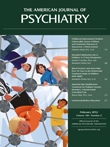Ventral Striatum Response During Reward and Punishment Reversal Learning in Unmedicated Major Depressive Disorder
Abstract
Objective:
Affective biases may underlie many of the key symptoms of major depressive disorder, from anhedonia to altered cognitive performance. Understanding the cause of these biases is therefore critical in the quest for improved treatments. Depression is associated, for example, with a negative affective bias in reversal learning. However, despite the fact that reversal learning is associated with striatal response in healthy individuals and depressed individuals exhibit attenuated striatal function on multiple tasks, studies to date have not demonstrated striatal involvement in the negative bias in reversal learning in depression. In this study, the authors sought to determine whether this may be because reversal learning tasks conventionally used to study behavior examine reversals only on the basis of unexpected punishment and therefore do not adequately separate reward- and punishment-based behavior.
Method:
The authors used functional MRI to compare the hemodynamic response to a reversal learning task with mixed reward- and punishment-based reversal stages between individuals with unmedicated major depressive disorder (N=13) and healthy comparison subjects (N=14).
Results:
Impaired reward (but not punishment) reversal accuracy was found alongside attenuated anteroventral striatal response to unexpected reward in depression.
Conclusions:
Attenuated neurophysiological response of the anteroventral striatum may reflect dysfunction in circuits involving afferent projections from the orbitofrontal, limbic, and/or mesostriatal dopaminergic pathways, which conceivably may, together with the ventral striatum, underlie anhedonia in depression. Learning to appreciate and enjoy positive life experiences is critical for recovery from depression. This study pinpoints a neural target for such recovery.



